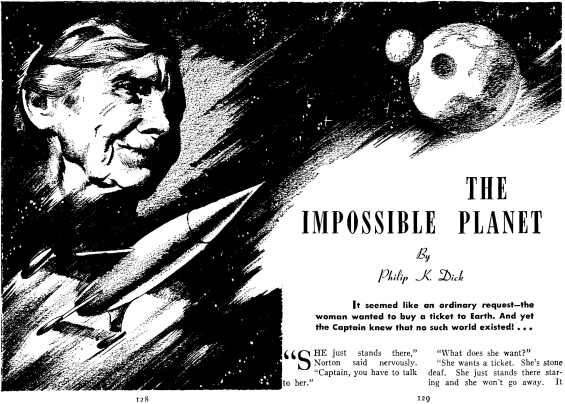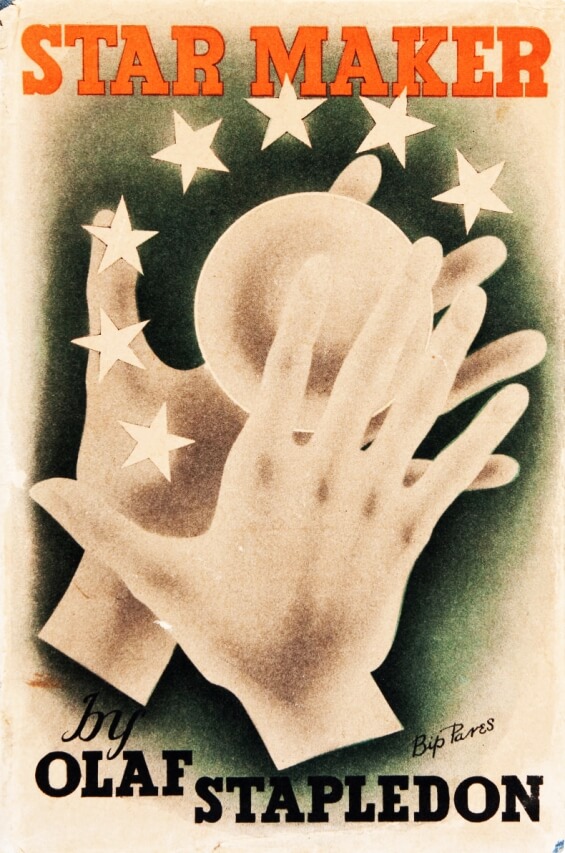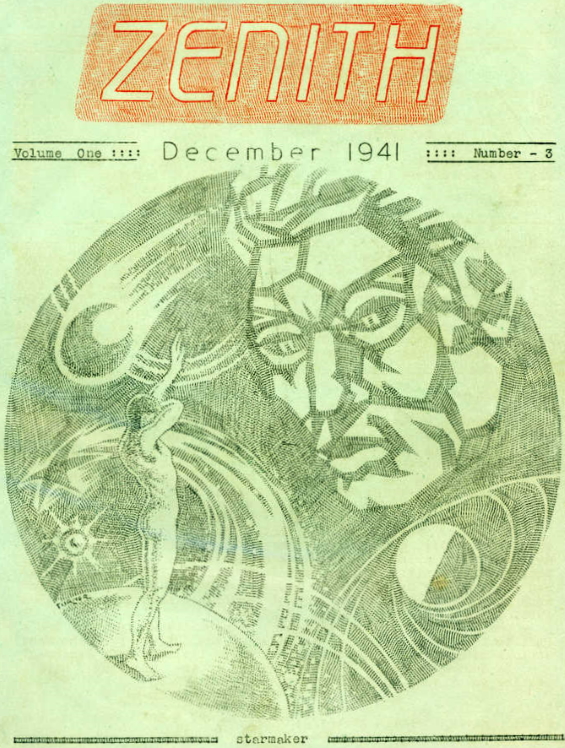
 The SFFaudio Podcast #461 – Jesse, Paul, Marissa, and Evan Lampe talk about The Impossible Planet by Philip K. Dick
The SFFaudio Podcast #461 – Jesse, Paul, Marissa, and Evan Lampe talk about The Impossible Planet by Philip K. Dick
Talked about on today’s show:
Imagination, October 1953, Philip K. Dick’s Electric Dreams, not that bad?, a lot to like, hate the ending, The Hood Maker, ambiguous clever or something, the story doesn’t need that, a tale of ecology, a fake tourist experience, they don’t know what they’re doing, what are you doing here?, long lost Earth, myth and legend, Isaac Asimov’s galactic empire, two kilo pos, love story, grandmother, grandfather?, incest issues, skinny dipping, more confusing, is it really happening?, a shared delusion?, a fairy realm?, deluding the same thing, she brought along some clothes, it’s Earth in the story, the twist in the tail, Planet Of The Apes, Richard, the coin, titillate our curiosity, the meaning of the coin, it could be Earth in the TV adaptation (but there’s no evidence for it), hook shaped rocks, the robant (robot) is lying, motivations, bad writing, we don’t get the ending, tell us what it means Jesse, struck, she’s the same old woman who appears in a handful of Dick stories, the old woman in The Cookie Lady, a personality, a sexuality, Captive Market, Douglas or Doug in a story is Philip K. Dick, The Geek’s Guide To The Galaxy, writing women, why is she an old woman and not an old man?, gender swap, he buries her in the sea, some birds flying around, E. Pluribus Unum, “out of many, one”, a subtle environmental message, a symbol out of where we came from (the sea), it doesn’t look like Earth, I didn’t want it to be like that, all the money being made on genetic ancestry, big business, kinda bougey, white privilege, she’s rich, or is she using her last resources?, this is not what I want, Lovecraft is obsessed with ancestry, you better not look to much, a historical argument, genocide and slavery, no idyllic past, historical memory, North Carolina, some very weird things, the forgetting of the Earth, despoiled, garbage floating in that ocean, Strange Eden, ancient astronauts, Circe, develop the planet, humans are terrible, when you go picnicing, when Mother Earth returns to die, supposed to have a resonant feeling, the robant as a culmination of the industrial society, big red eyes (I’m angry?), Fondly Fahrenheit, almost beautiful, he went along with the scheme, the acting is good, the scripting isn’t very good, an extra character (the girlfriend), science fictional trappings that don’t resonate, it only makes sense if they’re delusional, no time travel explanations, he doesn’t really love his girlfriend, he’s from the periphery of the empire, the captain, whatever weird porn, fake sex, fake tourist sites, make the rubes happy, the girlfriend wants to go to the “city” too, the rat race of the corporate ladder, maybe the old lady is his true love, it is weird that he has these old women characters, formulaic vs. instinctual, what her body is like, how beautiful she is (really), sexualize a 340 year old lady, the money is double, the names are the same, old women can be beautiful, she’s going back, give this woman some dignity, the guys are kind of the assholes, not about the dignity of her death, a suicide pact, a suicide mission, the service worker angle, you waitress pretends to like you, the rubes, fakeness, they’re lying the whole time, this is Earth, it’s not Earth, oh, it’s Earth!, a lie that turns out to be the truth, genuineness, genuine emotion, genuine reality, the industrialization, the robant is more loyal than the humans, Norton, beautiful and dark, they sink into it together, muddle motivations, its only there to scold Andrews, the American experience, we need punishment, they’re channeling Americans, there’s no punishment at the end for the two liars, we don’t need punishment, it is not about punishment, why she’s a woman makes sense if her robant is her loyal servant, to deliver her for that scene, the original title was supposed to be Legend, a quest like the one for the Holy Grail, from thirty years ago, The Twilight Zone (1985/6), Voices In The Earth, ghosts, grass and flowers, repopulating the Earth, a Wall-E style rebirth, an elegy not a renewal, nature doesn’t give a fuck, there are no ghosts, the slug that crawls over that rock from a temple from 1,000 years ago doesn’t care, what makes something true, not a justified true belief, the skeletal moonlight, the recycling bin, we’re outside of the story, she’s representative of nature, leaves and branches, a voice like rustling leaves, a faded leaf carried on the wind, the Earth is cracked congealed baked degenerate, crusted with salt and waste, line by line, evocative and beautiful, Earth is green, what do we make of her being deaf?, different deafness, sensitive to the hearing community, hearing loss vs. complete hearing loss, the second to last page, Andrews, senile and deaf, easier to justify tricking her, disability, if she’s representative of Nature, Nature doesn’t speak to us, they can say things right in front of her, spitting on Mother Nature, it works somehow, a small idea, The Commuter, Prominent Author, wonderful technology, a joke, devastating the Earth so badly we won’t even know it is Earth, Planet For Transients, Survey Team, post-humans, leaving their mother, the seeds for a new form of life, a human civilization on Mars, this is what our species does, die and face our sins, that should have been the story, I go to the hair salon, their stylized white hair, upping the pink nebula, weird bouffant hair, regular mousy black, vs. Louis XIV hair, are we supposed to be disgusted by the tourists, class warfare, fulfilling her wishes, fell flat, she can hear the bird, Andrews is interpreting it correctly (just low on oxygen), toxins and radiation, fantasy is comforting, maybe Jesse dreamed the comfort, how harsh reality is, the comfort of a woman’s body, late late late winter and spring romance, that’s all the tourist experience is, Innocents Abroad by Mark Twain, the intersection of old empires, the Roman Empire, Syria, Bible stories, the British, French, and American empires, poverty, managed and regulated, Hunting The Deceitful Turkey, hunting, Mother Nature is tricky and deceitful and full of irony, betrayed by her own bone, he’s a bad shot, if you interpret it right, he’s a vegetarian, too sensitive, reading Twain, Mark Twain deflecting with humour, Dick meditates in the spaces of the characters, the other characters are only there to deliver the scenes, how horribly we treat people, selling the dream, and sometimes they do get it, accidental moment of grace, research, hallucination, give her a fake memory of visiting Earth, that open question, the death chamber scene in Soylent Green, Edward G. Robinson (Sol), removing the ambiguity, the signature of this whole series, taking the lesson of Inception (2010) to heart too much, liquid realities, thematically grounded vs. fuzzy, The Commuter is an amazing and subtle short story, I can see it, he can’t see it.

Posted by Jesse Willis

